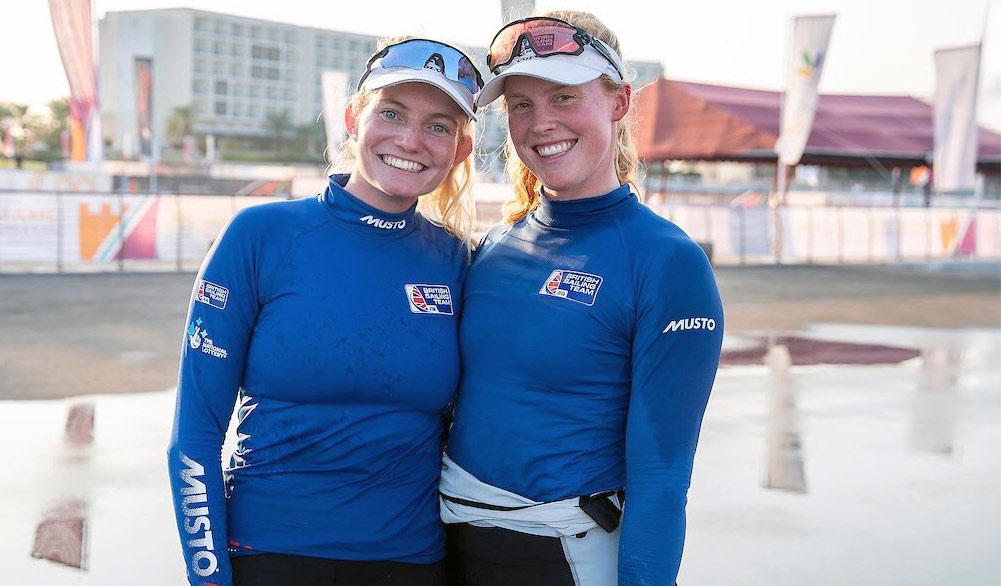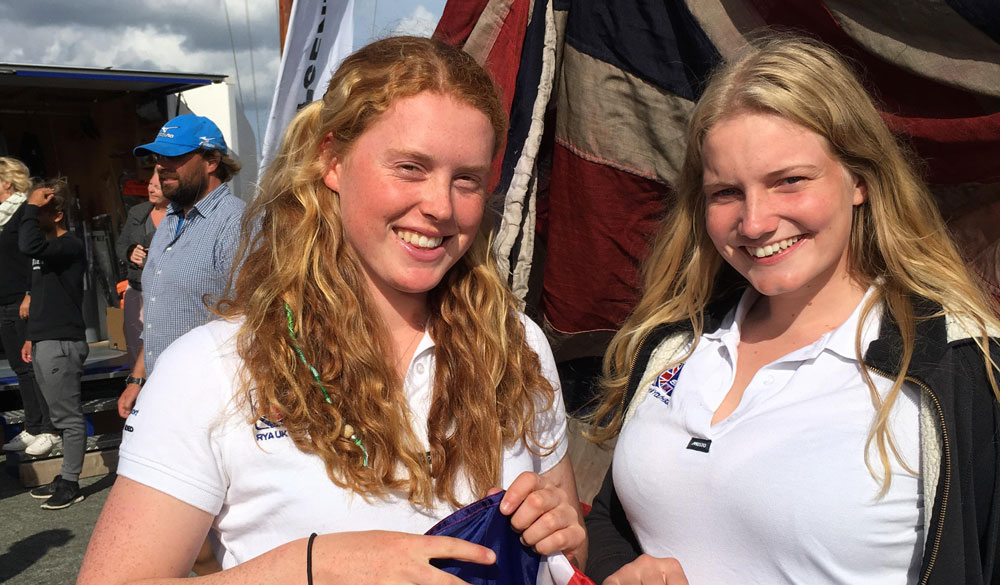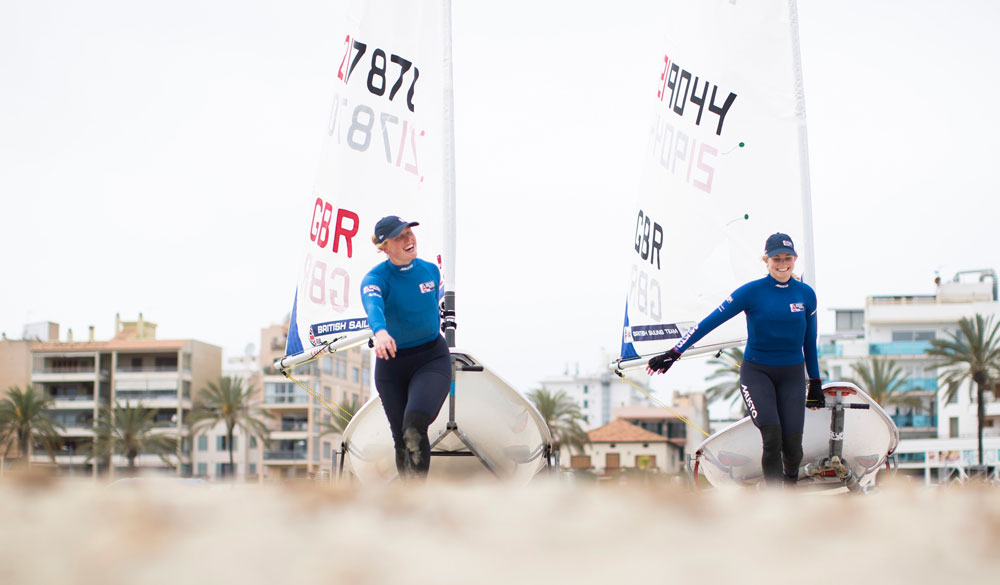Breaking Waves: A reflection on water with British Sailing Team athletes Daisy Collingridge and Matilda Nicholls
The RYA sits down for a unique Q&A with British Sailing Team athletes Daisy Collingridge (25) and Matilda Nicholls (23)

Daisy Collingridge
Daisy Collingridge began sailing in London, inspired by Olympic sailors like Hannah Mills and studying at Psychology at the University of Bath. Now part of the British Sailing Team, she won bronze at the 2017 Youth World Championship, is an ILCA 6 UK National Champion, and placed 7th at the ILCA 6 Senior Europeans in 2021 and 2022.
Matilda Nicholls
Matilda Nicholls, from Hampshire, sails for Aldeburgh Yacht Club and studied Psychology at the University of Exeter. She started sailing Optimists at age seven, became ILCA 4 Under 16 European Champion in 2016, joined the British Sailing Team in 2019, and won the 2019 ILCA 6 Youth World Championship. She placed 15th at the 2021 ILCA 6 Worlds and 4th at the 2022 Europeans.

Reflecting on their sailing journeys, these remarkable women share their experiences of being females in sport, the challenges they’ve faced, and their views on how we can help to break down barriers to get more women and girls out on the water.
Q: What inspired you to take up sailing?
Matilda: Growing up, I was part of a big sailing family, and both my parents and grandparents were very outdoorsy. We all just loved being outside, on the water and off the water and that’s where it all came from.
Daisy: My dad was a massive influence for sure. I was one of four kids, and it was a kind of rite of passage in our family. We all sail in slightly different ways.
Q: Have you faced challenges as female athletes in sailing?
Daisy: If you’d asked me a year ago, I’d have probably said no but recently I’ve had time to reflect on my experiences and realised it can be really challenging being a female athlete. I’ve had experiences of sexism in my sailing career - some of it was from people closest to me, some from people I hardly knew, some was completely subconscious and not deliberate.
I think it all feeds back into how you view yourself and the way you view other female athletes. It was an eye-opening experience. I had to sit down and ask myself if I champion female athletes and myself in the way I should. That was a pivotal moment for me and why I’m so keen now to use my voice for female empowerment in sport, supporting other athletes coming up and looking at the challenges we face.
Matilda: There have been loads of challenges throughout my sailing career, especially, being a female in sailing. When I was in junior squads, you get put in a room for fitness testing and split into girls and boys. Then all the girls are told to line up and do press ups, and you’ve got all the boys watching you, and you’re 14, you’ve just hit puberty, and you can only do one or two press ups. It sort of starts from there.
Q: What do you think needs to change to improve opportunities for women in sailing?
Daisy: I’m reading a book, called The Female Body Bible – the whole idea is women aren’t just smaller men – we have to be treated differently because we are different. From a young age boys and girls train together which is important, but it is about recognising the differences, and tailor the approach.
Matilda: As an elite athlete now, and being much older, we’re lucky on the Olympic circuit to have a 50/50 split of opportunities for medals, for both men and women. This makes the pathway a lot fairer and more equal. That said, I have stepped into the professional yacht sailing world, and it’s completely different. It’s very male dominated and harder to be respected as a female sailor. After you win an Olympic medal, there aren’t really many opportunities outside the world of yachting to be a professional sailor. There are some incredible women that have stepped into the field and been successful. Just hearing their stories and how they did achieve this is great for younger people like me and even younger than that. But you have to give women that opportunity to start with.
Q: Do you see yourselves as role models?
Matilda: Role models were really important to me when I was growing up, having other women in my sport who I could learn from and aspire to. When I was 14, I got to race against Ali Young in the ILCA qualifiers. At the time she was the Olympic representative, and I just remember it being the coolest thing ever.
Now, all of a sudden, I’m that role model and when I turn up to the ILCA qualifiers, I have young girls coming up to me, keen to chat and ask questions, and that’s really cool.
Daisy: It’s complicated but special, and I know how important it is. I’ve done quite a lot of coaching, and I saw it in an ILCA 4 squad I was coaching. There were three girls who were really close and super competitive on the water, but they were also best friends, which was quite special. I could see they valued my input, as they’d watched our journey as a squad. It has a massive impact.
I think to be a role model you need to be relatable to them so they see us and think, “Okay, I could totally do that as well.” You’re not going to relate to a male role model in the same way.
I definitely take the responsibility more seriously now and think about ways that I can help people—not just being a female athlete. Obviously, that’s important and speaks for itself. But I look for ways I can give back: inspiring people through talks, mentorship, coaching, and having an active presence as female athletes come up the pathway.
Matilda has also been a massive figure for me throughout my youth career. She joined the ILCA squad after I’d been in it for a year or two, and she pushed me really, really hard. I definitely wouldn’t be here without her.
It’s rewarding when you see the impact you’ve had on someone—when they take in what you said, and it really resonates with them. It’s powerful and motivating, but it’s also just the right thing to do.

Photo credit - World Sailing
Q: What advice would you give to girls wanting to pursue sailing?
Matilda: First of all, have fun, make sure you’re enjoying whatever you’re doing and try to accept that failing or making a mistake is actually an amazing learning opportunity. Setbacks are not as bad as they seem at the time, and it’s not the end of the world. You can learn so much from them if you have the right attitude and approach and then come back stronger.
Daisy: I think when I was younger, I confused the difference between feminism and being feminine. I’m a strong person, and I used to feel really insecure about that. I hated having my shoulders and arms out at school because of this idea that we’re all supposed to be petite, small, delicate, or whatever society’s construction of femininity is.
Now, I’m so proud of how strong I am. It shows how hard I’ve worked, the hours I’ve put into the gym, and the passion I’ve shown for something I love and care about. I think it’s important to remember that as a female athlete growing up, it’s easy to focus on the negative bits of social media or question whether you should be doing this. The answer is 100% yes. You can create your own definition of what being feminine means.

Q: How can we make sailing more appealing and accessible to girls?
Daisy: So many clubs and federations are trying to figure out how to make sailing more attractive to females. There’s quite a lot of research out there showing that girls really value social connectedness, especially when growing up and going through puberty, and that’s quite hard to achieve when sailing singlehandedly.
So, it’s about thinking how we can create that connection around being solo in your boat. Things like ensuring there are additional social activities, such as competitions, interactive training camps, and evening social events like bowling or watching a movie, can help. Even fitness training together can make it more appealing for girls growing up.
Matilda: I think promoting female role models is really important. It’s about showing that it’s possible for all girls out there to give it a go and be really successful.
Understanding the nature of sailing is important. There are so many opportunities and types of boats you can sail. Some are more physical, some are less physical; some focus more on tech, others on strategy and racing. Beyond the Olympic side, there are foiling classes, yacht sailing, and it is all getting better. The opportunities are really opening up for women at the moment —it’s a cool sport to get involved in.
Q: Are there any beginner friendly sailing programmes or initiatives you’d recommend to girls or women to give sailing a try?
Matilda: Yes! I did loads with the Andrew Simpson Centre when I was younger. They offer all kinds of different classes, and they’ve got a couple of bases around the UK. Whether you’re a beginner or intermediate, getting your RYA Level 2 courses, wanting winging lessons, or windsurfing—they do it all.
Daisy: I’d definitely check out the RYA website—there’s a lot of information to help people take their first steps in the sport. The Andrew Simpson Foundation is also a brilliant charity, helping people who might not otherwise get the chance to get involved in sailing or on the water in the first place.

Photo credit - Lloyd Images
Q: What’s the future for women in sailing?
Daisy: The future is so bright for women in sailing. It’s the most exciting time—there’s so much going on. We’re being celebrated on a stage like we never have before. There’s been a significant shift, and I can only see it continuing. I’m so excited and passionate about it—I want it to happen as soon as possible.
We need to address barriers head-on, and organisations need to be held accountable for reaching the targets they set. For instance, World Sailing has set gender equality targets regarding leadership, and that’s going to be so important because when you have diversity in decision-making, it naturally trickles down the sport. The future is bright.
Matilda: I think the future is full of opportunity. We’ve had the first women’s America’s Cup this year, and there’s a massive future in the foiling world. Olympic sports now have a 50/50 split of opportunities for men and women, and the yachting world is growing too. There are so many opportunities opening up for women in our sport. I think we just need to advertise them better, explain the opportunities and create a welcoming, not male-dominated, environment
I'm just loving being able to see all the younger girls coming up—they’re so keen and ask loads of questions. I can’t wait to see how they progress over the next few years.
What would you say to girls who want to get into sailing but are worried about education?
Matilda: I know that’s a concern for lots of girls. On the Olympic side, you can still go to university. I did, and I managed to get a first from Exeter! Hannah Snellgrove, who competed in the Olympics, got a first from Cambridge, and many other women in our sport have been successful with their degrees.
Studying doesn’t have to stop you. The team is really supportive in helping balance studies and sailing, and they actively work to support future careers beyond the sport too.
